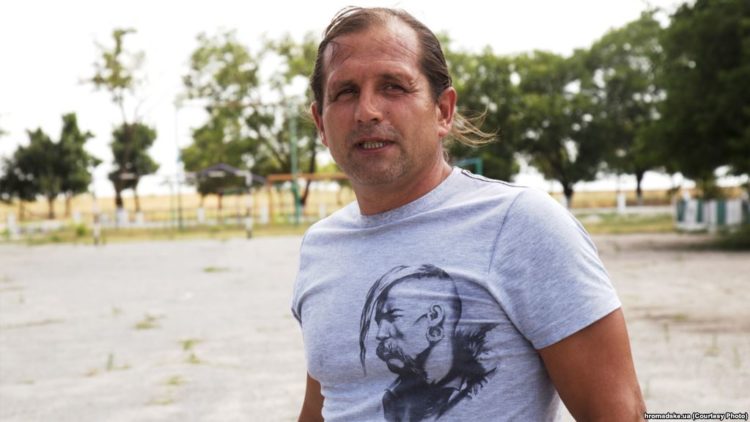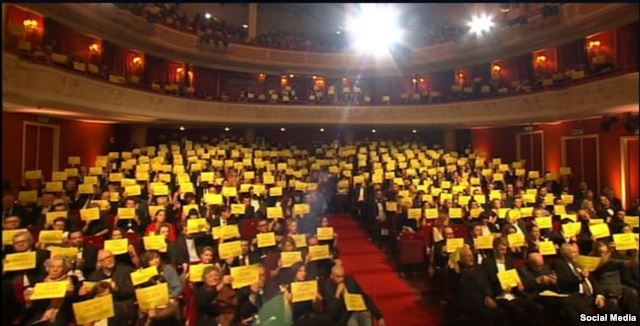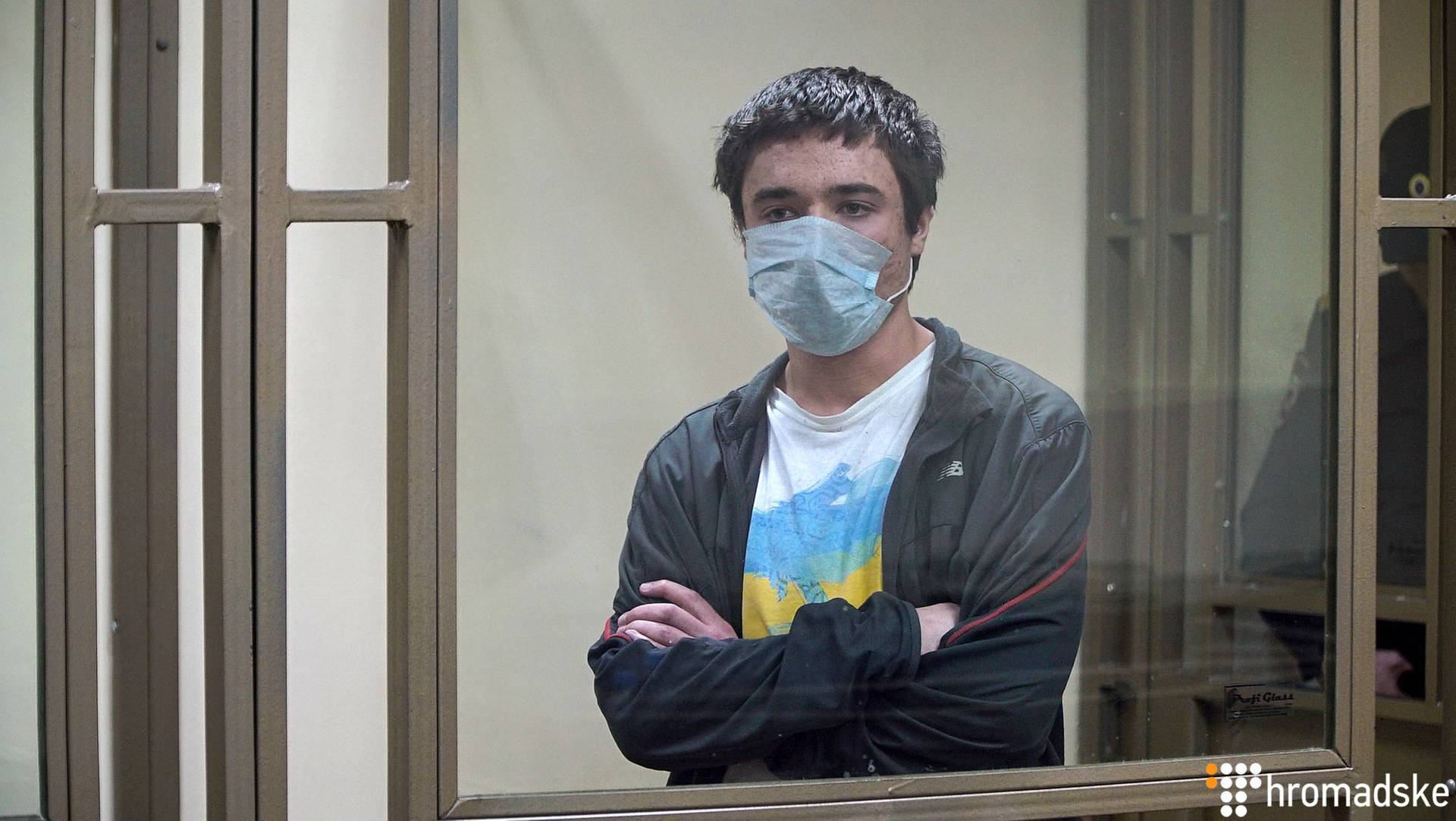Magnitsky-style sanctions could be a step towards freeing the circa 70 Ukrainian political prisoners of the Kremlin, said Ukrainian human rights activists during a visit to London in early November 2018, where they passed a list of those responsible for torturing Ukrainian political prisoners to British MPs, RFE/RL reported.
Human rights defender Maria Tomak, Igor Kotelianets, brother of imprisoned Yevhen Panov and head of the NGO “Association of the relatives of the political prisoners of the Kremlin” and Ihor Hryb, father of the Kremlin’s youngest Ukrainian political prisoner Pavlo Hryb and head of the department on prisoners in Ukraine’s Ministry of Temporarily Occupied Territories met with human rights NGOs – Amnesty International, Article 19, Minority Rights Group International, European Rights Advocacy Center and others.
As well, on 5 November, the Ukrainian human rights defenders took part in a public discussion in the British parliament titled “Russia’s human rights violations against Ukrainian political prisoners.” Conservative MP Robert Seely moderated the discussion with other Members of Parliament, experts, journalists, diplomats, and the Ukrainian community.
Just found out that @Ukraine Embassy today presented the @foreignoffice with a list of ‘hundreds’ of Russians involved with the torture and illegal imprisonment of Ukrainian and Crimean citizens in the war. Kiev wants action under #Magnitsky Act. @Billbrowder @edwardlucas
— Bob Seely MP (@IoWBobSeely) November 5, 2018
The discussions focused on the condition of the Ukrainian political prisoners, and especially – on the torture they are subjected to, as well as the medical assistance they need and are deprived of – for instance, Russia has allowed neither Ukrainian nor foreign doctors to access Ukrainians deprived of freedom in occupied Crimea or mainland Russia.
In this regard, the Ukrainian human rights defenders provided a list of Ukrainians and Russians violating human rights in Russia and occupied Crimea to Robert Seely MP, the member of the UK Parliament Foreign Affairs Committee and Foreign Office staff.
Maria Tomak insisted that it’s possible for the UK to expand the Magnitsky act it has adopted to include these people, as they are violating European convention of human rights, namely – the clause on the prohibition of torture.
“We consider it possible to extend the so-called ‘Magnitsky Act’ against these people, as it is a violation of the European Convention on Human Rights, namely tortures”, said Ms.Tomak.
Regarding the possible implementation of the “Magnitsky Act,” Robert Seely MP said: “I think the way the UK government reacted to the poisoning of the Skripals, is a rather remarkable example of an effective counteraction to Russia’s crimes.”
The Ukrainian embassy and Ukrainian human rights defenders called upon British MPs to hold debates dedicated to the Ukrainian prisoners of the Kremlin and measures which could force Russia to stop the torture and release them, as well as giving the necessary medical aid.
Prior to the meeting with Robert Seely MP, the human rights activists handed over the abovementioned list to the UK Foreign Office. The First Secretary of the Ukrainian Embassy in the UK, Mr. Denys Sienik, said that there are currently no governmentally approved lists, but non-governmental organizations are negotiating with the Foreign Ministry of Ukraine on this matter.
The attendees of the meeting in Parliament were also Olha and Ihor Hryb, sister and father of political prisoner Pavlo Hryb, as well as the head of the group of political prisoners’ families Mr. Ihor Kotelianets, Yevhen Panov’s brother who is the inmate of the case of the so-called “Crimean saboteurs.” Mr. Kotelianets stressed that statements from countries such as the UK are indeed helpful in stopping tortures against Ukrainian citizens in Russian prisons.
“Today we had a meeting with the representatives of the Foreign Office to remind about all Ukrainian political prisoners. This is exactly what Oleg Sentsov had been starving for – to voice not only for himself but primarily for other illegally convicted people,” said Mr. Kotelianets.
Ukrainian filmmaker Oleg Sentsov had held a hunger strike for 145 days, demanding to free the Ukrainian political prisoners held by Russia. He stopped it under threat of imminent force-feeding.
There are around 70 Ukrainian political prisoners of the Kremlin.
Robert Seely is an MP of the House of Commons from the Coservative Party and also a member of the Foreign Affairs Committee. He has on numerous occasions criticized Russian President Vladimir Putin and is known for supporting sanctions against Russia, in particular – for using the “Magnitsky act” to fight “dirty Russian money.”
The “Magnitsky Act” is a law adopted in the USA and a number of other countries which allows applying economic sanctions and enacting travel bans on persons guilty of human rights violations. The British Parliament adopted the law in May 2018.
Read also:
- Oleg Sentsov won the Sakharov prize. Here are his most inspiring quotes
- Dozens of cultural actors in France appeal to free Sentsov and all Ukrainian political prisoners
- EU calls on Russia to release Sentsov and all Ukrainian political prisoners
- Imprisoned Ukrainian filmmaker Oleg Sentsov stops hunger strike on day 145
- French celebrities launch chain hunger strike in support of Oleg Sentsov and other Ukrainian political prisoners of the Kremlin
- “The Trial,” documentary about Oleg Sentsov, opened for free international screenings
- EU parliament calls to release Sentsov and all Ukrainian political prisoners of the Kremlin
- World intellectuals implore politicians to boycott World Cup until Russia frees Ukrainian political prisoners
- From Crimea to Siberia: the prisons where Russia holds hunger-striking political prisoners Sentsov&Kolchenko
- The Sentsov-Kolchenko case: what you need to know
- Ukrainian filmmaker on 87th day of hunger strike in Russian prison writes that “end is near”








